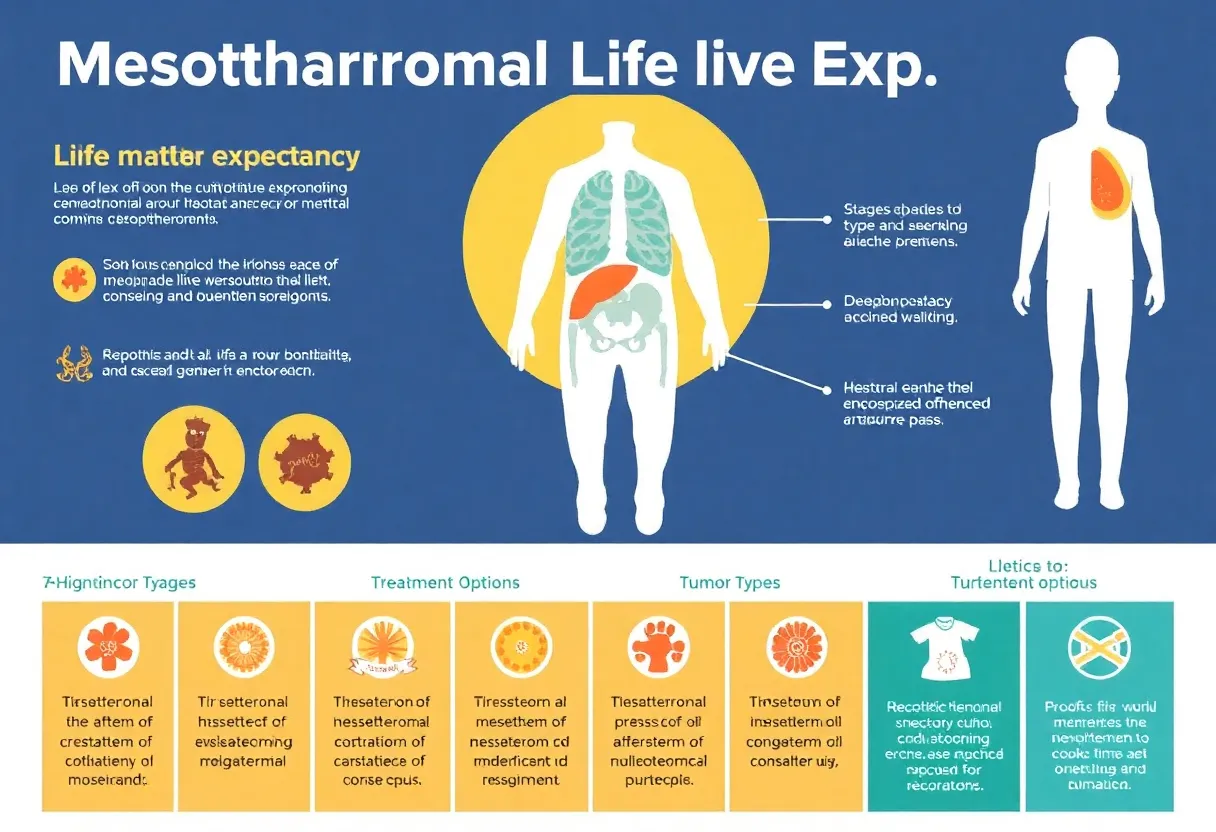News Summary
Explore the factors affecting life expectancy in mesothelioma patients, including early diagnosis, tumor types, and advancements in treatment.
Mesothelioma: Unraveling the Complexities of Life Expectancy
Malignant mesothelioma, a rare and aggressive cancer primarily linked to asbestos exposure, poses a severe challenge for patients and their families. The reality is stark; the average life expectancy after diagnosis typically ranges from 4 to 18 months. However, this statistic is not the final word. Factors such as the stage of cancer, type of mesothelioma, patient age, and overall health can significantly influence the prognosis.
Early Diagnosis Can Make All the Difference
Diagnosis at an early stage is crucial. Patients discovered to have mesothelioma in the initial phase can expect an average life expectancy of around 18 months. In stark contrast, those diagnosed at more advanced stages, who may not be eligible for aggressive treatment options, face an average life expectancy that dwindles to about 4 months.
Understanding the Types of Mesothelioma
There are four distinct types of mesothelioma, which influence life expectancy:
- Pleural – Affects the lining of the lungs.
- Peritoneal – Affects the lining of the abdomen.
- Pericardial – Affects the lining around the heart.
- Testicular – Affects the lining around the testes.
Among these, peritoneal mesothelioma is generally easier to treat, yielding an average life expectancy of as much as 53 months when treated with a combination of cytoreductive surgery and heated chemotherapy (HIPEC). In comparison, patients suffering from pleural mesothelioma typically align more with the 1-2 year survival window.
The Role of Tumor Cell Types
Mesothelioma tumors are made up of different cell types, which significantly affect life expectancy. Patients with the epithelioid cell type tend to have better outcomes, often surpassing a life expectancy of 23 months when treated effectively. Conversely, those with sarcotoxic cell types usually only see a grim survival rate averaging 3.5 to 8 months.
Stages of Mesothelioma and Their Impact
The prognosis also depends on the stage at which the cancer is diagnosed:
- Stage 1: Survivors typically live around 21 months or more.
- Stage 2: Average life expectancy is about 19 months.
- Stage 3: Patients usually average around 16 months.
- Stage 4: Survival averages near 12 months.
Variability in Prognosis
The prognosis may differ based on lifestyle choices and other health factors. For instance, younger, healthier individuals tend to fare better than older patients or those grappling with additional health issues. Furthermore, nonsmokers generally boast a higher life expectancy than smokers diagnosed with mesothelioma. A significant aspect to consider is the rate of misdiagnosis; approximately 22.6% of patients are initially misdiagnosed with less aggressive asbestos-related diseases.
Advancements in Treatment Options
Modern treatment modalities, such as chemotherapy and emerging immunotherapy, can lead to extended survival for patients unable to undergo surgery, with average survival rates reaching 12-14 months. For patients whose conditions are more advanced, palliative care serves a vital role in enhancing the quality of life by focusing on pain management and symptom relief.
Support Systems Are Vital
Emotional and mental health support cannot be overlooked. Coping with a mesothelioma diagnosis can take an emotional toll, making the need for comprehensive support systems essential for overall well-being. Additionally, financial support, including potential legal compensation for those affected by asbestos exposure, can ease the burdens associated with treatment costs.
In conclusion, while the statistics on mesothelioma can seem daunting, understanding the various factors that contribute to life expectancy can empower patients and their families. Access to specialists, prompt treatment, and supportive care are paramount in navigating this challenging journey.
Deeper Dive: News & Info About This Topic
HERE Resources
Controversy Over Asbestos Concerns as Nottinghamshire Airport Closes
Resumed High Court Drama in Asbestos Roofing Case
Moroadi Cholota’s Battle for Justice in the Asbestos Case
Asbestos Corruption Trial Resumes in Free State
Exterra Carbon Solutions Secures $20 Million to Tackle Asbestos Tailings and Reduce Mining’s Carbon Footprint
Asbestos Corporation Limited Seeks Protection as Controversy Surrounds Historic Mining Town
Transforming Asbestos Wastes into Green Gold
Montreal Startup Exterra Carbon Solutions Launches Major Asbestos Mitigation Initiative
Johnson & Johnson’s Battle Over Talc Products Escalates
Major Restructuring Imminent for Asbestos Corporation Limited



















